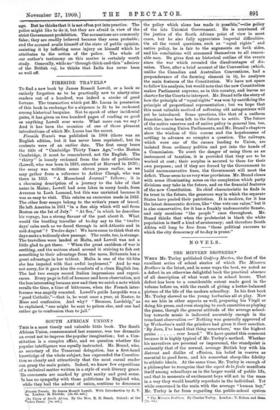FIRESIDE TRAVELS.* To find a new book by James Russell
Lowell, or a book so entirely forgotten as to be practically new to ninety-nine readers out of a hundred, was indeed a stroke of good fortune. The transaction which put Mr. Lucas in possession of this book in exchange for a sixpence is fit to be reckoned among historical bargains. Not to speak of other incidental gains, it has given us two hundred pages of reading as good as anything Lowell ever wrote. What more can we say ? And it has been the occasion of one of those pleasant introductions of which Mr. Lucas has the secret.
Fireside Travels was published in 1864 (there was an English edition, but it has never been reprinted), but its contents were of an earlier date. The first essay bears the title of " Cambridge Thirty Years Ago,"—the Boston Cambridge, it must be remembered, not the English. The "thirty" is loosely reckoned from the date of publication (Lowell, who was born in 1818, entered at Harvard in 1836) ; the essay was written some eleven years earlier, as we may gather from a reference to Arthur Clough, who was there in 1853. "A Moosehead Journal" follows; it is a charming description of a journey to the lake of that name in Maine; Lowell bad seen lakes in many lands, from Avernus to Loch Lomond, but this was unvisited because it was so easy to visit. This relates an excursion made in 1853. The other four essays belong to the writer's years of travel. He left America in 1851 "in a. fine ship which will sail from Boston on the 1st of July." " At Sea," in which he describes his voyage, has a strong flavour of the past about it. What would the bustling traveller of to-day say to the " twelve days' calm such as we dozed through in mid-Atlantic and in mid-August" ? Twelve days ! We have come to think that six days make a tediously slow passage. The route, too, is strange. The travellers were landed at Malta, and Lowell was not a little glad to get there. " When the great cauldron of war is seething, and the nations stand around it striving to fish out something to their advantage from the mess, Britannia has a great advantage in her trident. Malta is one of the tit-bits she has impaled with that awful implement." And he was not sorry, for it gave him the comforts of a clean English inn. The last two essays record Italian impressions and experi- ences. Every page is full of humour and keen observation, not the less interesting because now and then we catch a note which recalls the time, a time of bitterness, when the French inter- ference was angrily resented. Lowell's guide Leopoldo was a " good Catholic,"—that is, he went once a year, at Easter, to Mass and confession. And why? " Because, Lordship," as he explained, " one might be sent to prison else, and one had rather go to confession than to jail."














































 Previous page
Previous page